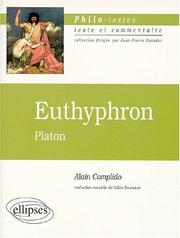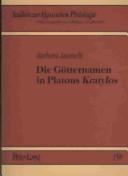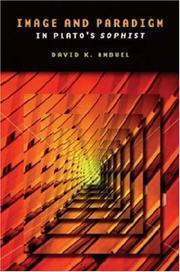| Listing 1 - 10 of 3958 | << page >> |
Sort by
|
Book
ISBN: 071080556X Year: 1984 Publisher: Brighton
Abstract | Keywords | Export | Availability | Bookmark
 Loading...
Loading...Choose an application
- Reference Manager
- EndNote
- RefWorks (Direct export to RefWorks)
Book
ISBN: 9783772811593 Year: 2008 Publisher: Suttgart-Bad Cannstatt Frommann-Holzboog
Abstract | Keywords | Export | Availability | Bookmark
 Loading...
Loading...Choose an application
- Reference Manager
- EndNote
- RefWorks (Direct export to RefWorks)
Book
ISBN: 3515053018 9783515053013 Year: 1988 Volume: 1988,9 Publisher: Mainz: Akademie der Wissenschaften und der Literatur,
Abstract | Keywords | Export | Availability | Bookmark
 Loading...
Loading...Choose an application
- Reference Manager
- EndNote
- RefWorks (Direct export to RefWorks)
Book
ISBN: 0715626418 9780715626412 Year: 1995 Publisher: London Duckworth
Abstract | Keywords | Export | Availability | Bookmark
 Loading...
Loading...Choose an application
- Reference Manager
- EndNote
- RefWorks (Direct export to RefWorks)

ISBN: 2729867112 9782729867119 Year: 1998 Volume: *1 Publisher: Paris: Ellipses,
Abstract | Keywords | Export | Availability | Bookmark
 Loading...
Loading...Choose an application
- Reference Manager
- EndNote
- RefWorks (Direct export to RefWorks)
Aristoclès, surnommé Platon, a vingt ans en 408 lorsqu'il découvre Socrate et la philosophie. Aux yeux du plus célèbre de ses disciples, le Maître représente l'incarnation de la Vérité et de la Justice. La condamnation à mort, pour impiété et corruption de la jeunesse, du plus sage des hommes en 399 par le peuple athénien lui apparaît comme un scandale pour la raison. Dans Euthyphron, un des quatre dialogues consacrés au procès et à la mort du philosophe, Platon met en scène une rencontre entre Socrate et un prêtre, Euthyphron, sur les marches du palais de justice. Accusé d'impiété, Socrate profite de la présence du « professionnel » en matière de religion pour tenter de comprendre le motif de la plainte déposée contre lui par un jeune poète, Mélètos. De leur dialogue, va naître une des interrogations majeures de la philosophie. Quels sont les fondements des valeurs religieuses ? Sont-elles compatibles avec les exigences de la raison ? Une morale rationnelle sans référence au sacré est-elle possible ? En suivant pas à pas, mot à mot le chemin du philosophe, nous avons voulu permettre au lecteur d'approfondir sa lecture en situant le dialogue par rapport aux grands thèmes de la pensée platonicienne.
Book
ISBN: 2130501974 9782130501978 Year: 1999 Volume: *25 Publisher: Paris: PUF,
Abstract | Keywords | Export | Availability | Bookmark
 Loading...
Loading...Choose an application
- Reference Manager
- EndNote
- RefWorks (Direct export to RefWorks)

ISBN: 0748611886 1474472303 Year: 1999 Publisher: Edinburgh Edinburgh University Press
Abstract | Keywords | Export | Availability | Bookmark
 Loading...
Loading...Choose an application
- Reference Manager
- EndNote
- RefWorks (Direct export to RefWorks)

ISSN: 01721798 ISBN: 9783631565292 3631565291 Year: 2007 Volume: Bd. 158 Publisher: Frankfurt am Main [etc.] Peter Lang
Abstract | Keywords | Export | Availability | Bookmark
 Loading...
Loading...Choose an application
- Reference Manager
- EndNote
- RefWorks (Direct export to RefWorks)

ISBN: 9781930972049 1930972040 Year: 2007 Publisher: Las Vegas Parmenides Publishing
Abstract | Keywords | Export | Availability | Bookmark
 Loading...
Loading...Choose an application
- Reference Manager
- EndNote
- RefWorks (Direct export to RefWorks)
The 'Sophist' sets out to explain what the sophist does by defining his art. But the sophist has no art. Plato lays out a challenging puzzle in metaphysics, the nature of philosophy, and the imitation of philosophy that is unraveled in this new and unconventional interpretation. Here is a new translation of this important late Platonic dialogue, with a comprehensive commentary that reverses the dominant trends in the scholarship of the last fifty years. The 'Sophist' is shown to be not a dry exposition of doctrine, but a rich exercise in dialectic, which reveals both the Eleatic roots of Platonic metaphysics and Plato's criticism of unrevised Eleaticism as a theoretical underpinning for sophistry The 'Sophist' is presented now not as an artefact of the intellectual past or precursor of late 20th century philosophical theories, but as living philosophy. In a new translation and interpretation, this late dialogue is shown to be a defense of not a departure from Plato's metaphysics. The book is intended to provide a complete interpretation of Plato's 'Sophist' as a whole. Central to the methodology adopted is the assumption that all elements of the dialogue to be understood must be understood in the context of the dialogue as a whole and in its relation to other works in the Platonic corpus. Three main points are argued: 1) the dialogue does not present a definitive or positive doctrine of the late Plato, but has the structure of a reductio ad absurdum; 2) the figure of the sophist is employed to critically examining the metaphysics of Parmenides. While acknowledging a core of metaphysical insight in Parmenides, the argument implies that, by failing to account for resemblance, Eleaticism implies an inadequate theory of relations, which makes impossible an adequate understanding of essence. Consequently, Eleaticism unrevised can be taken as the philosophical underpinning for the antithesis of philosophy, lending legitimacy to sophistry; 3) the criticism constitutes a
Book
ISBN: 9789053306567 Year: 2008 Publisher: Amsterdam Roeselare Mets & Schilt Roularta Books
Abstract | Keywords | Export | Availability | Bookmark
 Loading...
Loading...Choose an application
- Reference Manager
- EndNote
- RefWorks (Direct export to RefWorks)
| Listing 1 - 10 of 3958 | << page >> |
Sort by
|

 Search
Search Feedback
Feedback About UniCat
About UniCat  Help
Help News
News